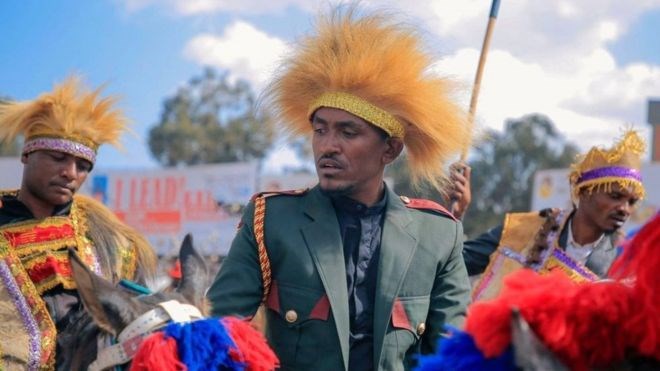
Sunday July 5, 2020

Ethnic unrest in the aftermath of the killing of Ethiopian singer Hachalu Hundessa has left at least 166 people dead, officials say.
A top police chief said 145 civilians and 11 security personnel died in Oromia region alone. Ten people have been killed in the capital Addis Ababa.
Hachalu, 34, was killed on Monday, sparking unrest that spread from Oromia where he was seen as a hero.
The motive remains unclear. Hachalu had said he had received death threats.
His songs focused on the rights of the country's Oromo people, Ethiopia's largest ethnic group, and became anthems in a wave of protests that led to the downfall of the previous prime minister in 2018.BBC Ethiopia reporter Kalkidan Yibeltal says ethnic and religious tensions have intensified in the aftermath of the killing.
Announcing the latest figures, Oromia deputy police commissioner Girma Gelam said 167 had "sustained serious injuries" during the unrest.
Mr Gelam said 1,084 people had been arrested, without providing further detail.
In his statement, the police official said the violent unrest had now "completely stopped".
Prime Minister Abiy Ahmed, himself an Oromo, who came to power in April 2018, has warned that those behind Hachalu's death wanted to derail his reform programme.
"We have two choices as a people. To fall into the trap being set up by detractors or to deviate from their trap and stay on the course of reforms. Choosing the first is to willingly aid them in our demise," the prime minister said.
Since his youth, Hachalu Hundessa was a thorn in the flesh of successive governments.
As a student in Ambo, a city at the forefront of the campaign by Oromos for self-rule, Hachalu joined student groups calling for freedom. At the age of 17, he was imprisoned for five years for his political activities.
He became increasingly politicised in prison, as he increased his knowledge about Ethiopia's history, including its rule by emperors and autocrats - and also developed his music skills.
"I did not know how to write lyrics and melodies until I was put behind bars. It is there that I learned," he said in 2017.
He released his first album Sanyii Mootii (Race of the King) in 2009, a year after walking free, and it turned him into a music star, and a political symbol of the Oromo people's aspirations.
However, he played down his political role, saying: "I am not a politician, I am an artist. Singing about what my people are going through doesn't make me a politician."
Why have Oromos been protesting?
The Oromo have long complained of being sidelined. Demonstrations erupted in 2016 and pressure built on the government.
The ruling coalition eventually replaced then-Prime Minister Hailemariam Desalegn with Mr Abiy.
He has brought in a series of reforms, which have transformed what was considered a very oppressive state.
However, long-standing ethnic tensions have boiled over into violence.
Mr Abiy won the Nobel Peace Prize in 2019 primarily for making peace with long-time foe Eritrea, but his efforts in transforming Ethiopia were also recognised.